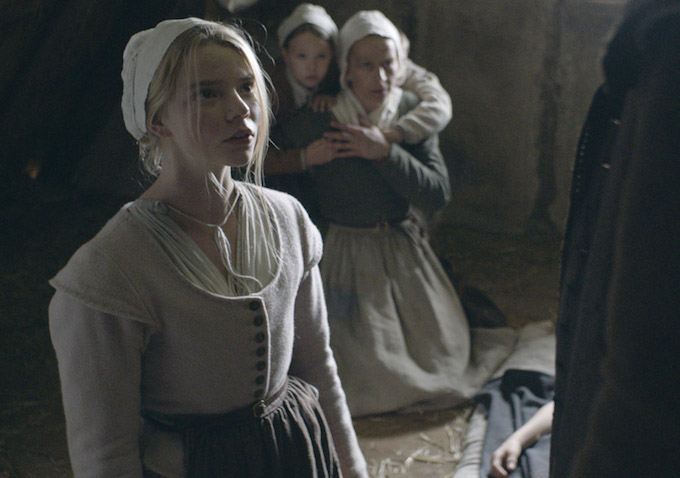 In cinema, witches are traditionally depicted as campy, melodramatic cartoons. They sport wicked noses, grotesque make-up and shrill cackling voices. But if one were to subtract all elements of broad humor and clichéd corniness and distill the frightening concept of witchcraft and evil to their base essentials, a chilling picture begins to emerge. Such is Parts & Labor’s “The Witch,” a spellbinding, absolutely nightmarish picture that will genuinely make your blood run cold.
In cinema, witches are traditionally depicted as campy, melodramatic cartoons. They sport wicked noses, grotesque make-up and shrill cackling voices. But if one were to subtract all elements of broad humor and clichéd corniness and distill the frightening concept of witchcraft and evil to their base essentials, a chilling picture begins to emerge. Such is Parts & Labor’s “The Witch,” a spellbinding, absolutely nightmarish picture that will genuinely make your blood run cold.
Set in 1630 New England, a devout Christian family is about to be excommunicated from their village thanks to the prideful and arrogant father. The family then makes their own pilgrimage to a nearby woods, decamps and builds their own self-sustaining farm next to a beautiful but coldly unforgiving landscape. This brief utopia doesn’t last. The woods breathe with a chilly portent and the children are told the area is off limits. But like a subconscious seductive cooing, the seemingly haunted forest beckons them near.

As the clan’s oldest daughter Thomasin tries to negotiate her severe parents, her burgeoning womanhood and her desire to remain a child, a tragedy occurs. Inexplicably, as she plays with the kinsfolk’s newborn son, he vanishes from sight. Mortally wounded, the grieving family begins to unravel. And just as they grapple with this disturbing and unexplained loss, their tenuous paradise begins to decay. Crops turn fallow, eggs crack with bloody rot and the strange and volatile goat of the farm develops bizarre behavioral traits.
As food grows scarce and the ethereal menace in the forest around them begins to grow claustrophobic, the family bonds are further tested as their piety, goodness and human nature begin to curdle. While “The Witch” may be an eerie horror, it’s also a creepy portrait of domesticity gone wrong. Is the family being punished by their father’s egotism despite their unwavering faith in God? Is it because of their piousness that they are targeted by a cruel and opportunistic evil? Or is it because, despite their self-righteousness, as we’re constantly told, they are sinners like the rest of mankind? “The Witch” never answers these questions, but its unholy suggestions of curse and damnation are myriad.

A deeply impressive first film by director Robert Eggers, “The Witch” is immaculately constructed, evinces an exquisitely ominous tone, and is unequivocally haunting. It’s exacting look at the dissonance of human nature is terrifying and I cannot count the number of times a shuddering chill ran through my body and the hairs on my neck shot up at full attention.
Eggers taps the iciness of Ingmar Bergman, the hypnotic qualities of Andrei Tarkvosky, the distress of David Lynch, and the omniscient otherworldliness of Stanley Kubrick’s “The Shining” and even "Barry Lyndon," in a witch’s brew concoction that is highly intoxicating. Throw in the idea of a demon-possessed Terrence Malick turned from the beauty of life to the foulness of the soul, and you’ll get an idea of this film’s atmosphere.

Starring a mostly unknown cast — Ralph Ineson, Harvey Scrimshaw, Ellie Grainger, Lucas Dawson — it’s Anya Taylor Joy as Thomasin who stands out. Kate Dickie (who some might remember from a small role in “Prometheus” or “Red Road”) is also devastatingly good as the inconsolable matriarch who loses children, sanity and sense of self.
As you might guess, unnerving mood and sinister atmosphere are everything for “The Witch.” The low-lit cinematography by Jarin Blaschke is top notch; dawn, dusk, and twilight are all rendered with spooky naturalism. Some of the glimmering candlelight photography, redolent of 17th century Dutch paintings, is also quite striking. Not enough can be said by Mark Korven’s spine-chilling and atonal score that employs obscure instrumentation, from hurdy gurdys, nyckelharps and creaky fiddles, to its most disquieting advantage. Discordant, ghostly qualities send tremors through the heart, and the way Korven knowingly references the percussive chain-rattles of Krzysztof Penderecki’s feverish cues is intelligent and remarkably effective.

Influenced by folktales and obviously the 1692 witch trials in Salem, Eggers’ icy hymn strikes the most primal fear in the notions of what is unnatural. Not just for the dutiful, but for all of mankind. An evocative look at the nature of evil and the inescapability of malevolence, “The Witch” will dazzle and shake you right to your core. [A]
This is a reprint of our review from the 2015 Sundance Film Festival.





